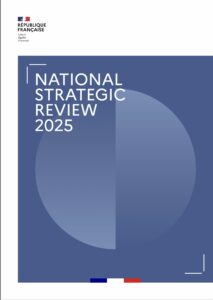
Economic Security: A Pillar of France’s 2025 Strategic Review
In a world marked by upheaval, where hybrid warfare and economic predation are wielded as weapons in their own right, France is adapting its defense posture. The 2025 update of the Revue nationale stratégique (Strategic Review – RNS) signals a major turning point: economic security is now deemed an essential function of national sovereignty. This article unpacks the rationale behind this strategic repositioning.
A Defense Strategy Expanding into the Economic Realm
As conflict intensifies at Europe’s borders and within hybrid spheres of competition, the 2025 Strategic Review introduces a new priority: protecting France’s industrial, technological, and scientific base from foreign threats. This evolving doctrine rests on a core certainty: economic security has become a precondition for national security.
Defending national territory no longer takes place solely on conventional battlefields but also in laboratories, start-ups, supply chains, and corporate boardrooms. The 2025 document promotes a systemic approach, incorporating SMEs, mid-sized companies (ETIs), innovative start-ups, and industrial champions into a comprehensive national security framework.
The Reengineered Economic Security Apparatus: France’s Sovereignty Watchtower
Since 2019, France has significantly overhauled its interministerial economic security system. This apparatus relies on close coordination between the Ministries of Economy, Armed Forces, Interior, Higher Education, and Foreign Affairs. Its mission: to detect, assess, and neutralize any economic threat to the Nation’s vital interests.
Operating upstream, it intervenes at the first sign of danger—dubious partnership proposals, hostile takeover attempts, or intrusive audits of strategic companies. While the primary focus remains on companies in the Defense Industrial and Technological Base (BITD), the scope now extends to civilian strategic sectors such as energy, AI, space, and biotechnology.
The 1968 Blocking Statute: A Reemerging Tool of Strategic Defense
At the heart of this economic security strategy is the reinvigorated use of the 1968 Blocking Statute (Loi de blocage), which prohibits French companies from transmitting certain sensitive information to foreign entities without prior government authorization.
With the rise of extraterritorial and intrusive audits—particularly from U.S. or Chinese authorities—the French government now actively encourages strategic companies to invoke this law. Innovative SMEs, deeptech start-ups, and dual-use ETIs are all affected. The objective is clear: protect against data requests disguised as “compliance” but motivated by foreign intelligence or regulatory leverage.
Foreign Investment Scrutiny Tightens Around the Defense Ecosystem
Foreign investment regulation now plays a key role in France’s broader economic security policy. The focus has shifted to enhanced vigilance over foreign ownership or control within the BITD ecosystem. The aim is no longer merely to block high-risk acquisitions, but to preempt any attempt to exert undue influence or circumvent national security laws.
French authorities now view certain minority stakes, poorly governed tech alliances, or asymmetric joint ventures as potential threats to economic sovereignty. This forward-looking posture is embedded in a broader doctrine of national resilience.
SMEs and Start-Ups: The New Frontline of Economic Security
France’s economic security strategy no longer centers solely on large corporations. SMEs and start-ups are now regarded as sovereignty assets in their own right. Many critical innovations originate in these agile yet often financially fragile organizations.
The 2025 Strategic Review provides for economic security audits, legal advisory on invoking the Blocking Statute, and access to secure financing for these companies. The goal is twofold: protect them from foreign predators—and prevent them from having to choose between financial survival and strategic sovereignty.
Cybersecurity as a Core Component of Economic Security
In the digital era, cybersecurity has become a vital element of economic security. BITD companies are now subject to contractual cybersecurity requirements, while SMEs and start-ups benefit from technical support.
Threats such as data theft, industrial system breaches, and client information capture represent vectors of economic weakening. The Ministry of Armed Forces—through the Directorate General of Armament (DGA)—plays a central role in strengthening the overall cyber maturity of France’s defense-industrial fabric.
A Financial Ecosystem Mobilized for Sovereignty
Economic security does not stop at regulation; it also requires proactive strategic investment in sensitive companies. Several financial instruments have been activated to that end:
- The Definvest fund for defense technologies;
- Bpifrance and the Public Investment Bank (BPI) supporting sovereign capital raising;
- Mobilization of financial actors to counter the adverse effects of overzealous ESG standards on defense companies;
- Advocacy at the European level to ensure strategic firms can access funding from the European Investment Bank (EIB).
This policy embodies a deliberate “European preference” aimed at “designing European, producing European, and buying European.”
A Territorial and International Strategy
Economic security also carries a territorial dimension, particularly in industrial regions and overseas territories. State services, regional prefectures, and local economic stakeholders are encouraged to collaborate in mapping vulnerabilities and enhancing resistance to foreign capture, interference, or deindustrialization.
Internationally, France is stepping up its normative defense against lawfare (the misuse of international legal tools), opposing coercive economic practices, and promoting a fair multilateral framework for economic competition.
A Deliberate Doctrine of Economic Deterrence
The 2025 Strategic Review unveils a shift in posture: France no longer aims only to defend—it aims to deter. Deter competitors from weakening its industrial champions. Deter foreign authorities from imposing unjustified audits. Deter financial institutions from shunning the defense sector due to regulatory misunderstandings.
Economic security is now an instrument of influence, power, and projection. It has been elevated to the level of a strategic function—on par with nuclear deterrence, military intervention, and cyberdefense.
From Resilience to Sovereignty
What the 2025 Strategic Review offers is a fully rearmed France—including in the economic arena. Economic security is no longer a niche issue for intelligence specialists—it has become a national policy priority and a condition for independence and international standing.
As fault lines shift, alliances realign, and threats evolve, protecting one’s economy means protecting one’s freedom. Against those who weaponize law, regulations, or capital flows to undermine France’s sovereignty, the State is now standing firm.
Useful Links

STRATEGIC
REVIEW
2025
Our Expertise
Relians is a strategic and institutional advisory firm that has been supporting companies facing these challenges for over 20 years. Drawing on deep expertise in regulatory texts, administrative practices, and applicable guidelines, expert in French FDI control, we help our clients structure their transactions securely, in full compliance with regulatory requirements and in a spirit of constructive engagement with the French authorities.
Relians – Specialist in Foreign Investment Screening.

